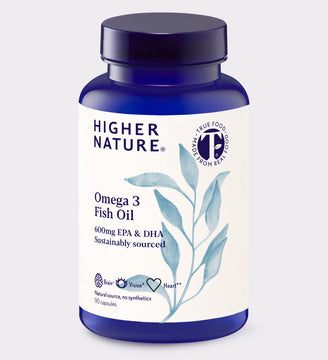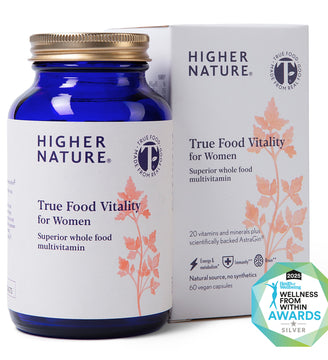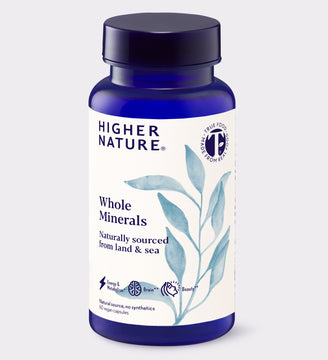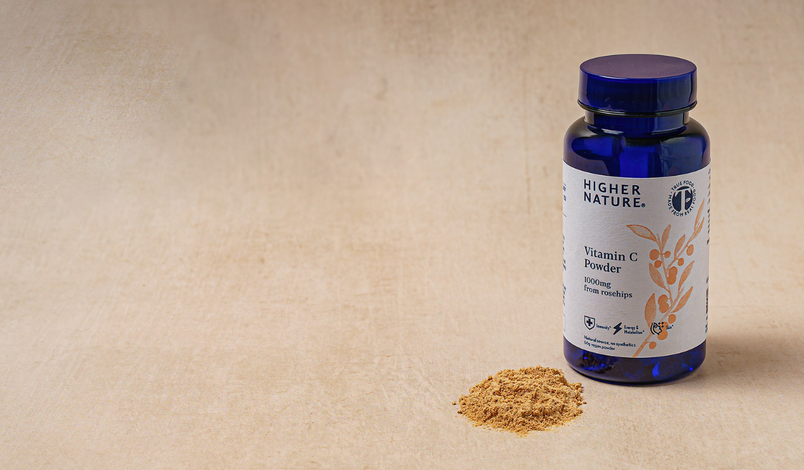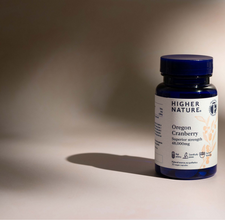
Don’t forget the men!
Higher Nature Nutrition Team
There is so much focus on women’s health that men often seem to be overlooked! However, certain areas of well-being are particularly high on the agenda for men, including mental health, weight management, skin and hair health and fertility.
So let’s take a closer look:
Good mental health
Common mental health issues such as anxiety, stress and depression are experienced by around 1 in 8 men in England. The “new normal” presents many additional challenges to us all, but don’t forget that your diet is a critical factor in your mental and emotional well-being. Good nutrition nourishes the brain and activates the neurotransmitters that affect your mood, energy and motivation.
Give your brain a boost by regularly eating oily fish such as salmon and mackerel as well as nuts, seeds and their oils. The brain is the control centre of the nervous system which must be well nourished to maintain equilibrium. So eat plenty of dark leafy greens, beans, lentils, nuts and seeds which are rich in B vitamins and the mineral, magnesium – often called “nature’s relaxant”. Feeling overwhelmed? Try supplementing the herbs ashwagandha and rhodiola to ramp up resilience and rebalance your nervous system.
Research also suggests that probiotics, taken by themselves or combined with prebiotics, may help to ease depression. What’s the difference? Probiotics supply friendly bacteria, such as lactobacillus and bifidobacterium which are natural residents of the gut, whilst prebiotics supply fibre to feed the friendly bacteria in your gut. They are thought to act by reducing inflammatory chemicals and may help direct the action of tryptophan, an amino acid believed to play an important role in mood.
Weight management – finding it hard to kick the sugar habit?
With underlying health conditions thought to be an important factor influencing the severity of covid-19, it has never been more important to look after our health. One of these underlying conditions is Type 2 diabetes, with men at higher risk than women of developing the condition. But the good news is that, unlike Type 1 diabetes, Type 2 is largely preventable by making simple dietary and lifestyle changes. Avoiding excessive sugar consumption and highly processed foods, particularly refined carbohydrates is key, but it’s also important to address physical inactivity and chronic stress levels which deplete important nutrients such magnesium and B vitamins. To keep blood sugar stable eat a nutritious diet including plenty of vegetables, healthy protein, whole grains and fats from oily fish, nuts and seeds. Enjoy low glycaemic fruits – which are slowly digested and absorbed, reducing the effect on blood sugar - such as berries, grapefruit, apples and pears.
Chromium is an essential nutrient involved in the normal metabolism of carbohydrates and fats and contributes to the maintenance of normal blood glucose levels.
Looking good! - skin and hair solutions
Men’s skin concerns range from dryness to sun damage and thinning skin. Collagen acts as scaffolding for the face and body but we naturally produce less from our mid-twenties onwards, leading to fine lines, wrinkles and sagging skin – unwelcome signs of the ageing process! Not only that - pollution, UV rays, smoking and high sugar diets also take their toll on the skin.
A diet rich in fruit and vegetables will provide vitamin C which is vital for normal collagen production as well as antioxidants to help protect skin from damaging free radicals generated by too much sun, poor diet and environmental pollution. And – for that extra boost - consider supplementing collagen and skin heroes such as hyaluronic acid and plant ceramides to hydrate and rejuvenate.
Concerns over hair condition and growth affect many men. Hormone balance is an important factor in hair growth, as is a varied diet providing key nutrients such as biotin, zinc and selenium found in eggs, fish, meat, whole grains, nuts and seeds.
The Annurca apple native to Southern Italy, is particularly rich in a plant compound called procyanidin B2, which has been shown to support hair growth and boost the keratin content of hair.
Fertility – it takes two to tango!
Maximising fertility is often seen as a woman’s issue, but it does, of course “take two to tango”! In fact low sperm count and poor sperm quality are contributory factors for one in every three couples unable to conceive. It is thought that damage by excessive free radical molecules may negatively affect sperm motility and sperm DNA integrity. Antioxidants such as vitamins E and C and the mineral selenium help to protect the body from free radical damage and studies suggest they may support sperm health. The amino acids, arginine and l-carnitine are also essential for sperm quantity, quality and motility.
Fertility-friendly foods
Colourful antioxidant nutrients, found in fruits and vegetables such as kale, spinach, Brussels sprouts, broccoli, green, red and yellow peppers, tomatoes, carrots, berries and oranges, are needed by both partners to protect against free radical damage to sperm and eggs. Tocopherol (vitamin E) literally means “to bear young” and is found in foods such as dark leafy greens, nuts, seeds and avocados. Beta carotene is a powerful antioxidant found in carrots, squash, sweet potatoes, spinach and kale. A fertility-friendly diet should also include protein-rich foods such as chicken, eggs, fish, nuts, seeds, quinoa, beans and lentils as well as complex carbohydrates such as brown rice, oats and wholemeal bread.
Omega 3 and 6 essential fatty acids are vital in producing beneficial prostaglandins (local hormone-like messengers) which are important constituents of semen. Oily fish such as salmon and mackerel supply omega 3 essential fatty acids, whilst pumpkin and sesame seeds not only provide essential fats but are also a rich source of zinc, which plays an important role in hormone metabolism, sperm formation and motility. Vitamin B6 and biotin help to convert the essential fats into prostaglandins, whilst vitamin B12 is thought to support healthy sperm production.
Healthy lifestyle
The technological age appears to be taking its toll on male fertility! Balancing computers on the lap may raise scrotal temperature which has been linked to poor sperm quality and male infertility.
Men should similarly avoid hot baths, saunas and tight underwear!
Environmental toxins from sources such as plastic food packaging, personal toiletries and pesticides may disrupt hormone balance and sperm production and should be avoided as far as possible.
Not surprisingly, studies suggest a negative effect for alcohol on the fertility of both partners and if you are still smoking – this is a great time to quit! Male smokers have been found to have lower sperm concentration, decreased motility (how sperm swim), fewer normally shaped sperm, and increased sperm DNA damage.
Steer clear of chemically altered, trans-fats, found in processed, refined snack foods and ready meals as they interfere with essential fatty acid pathways and may increase the risk of anovulatory infertility.
Finally, tension and anxiety can adversely affect both male and female partners. Studies have found that stress in women significantly reduces the probability of conception, so relax with activities such as meditation, yoga, deep breathing and walking. Then you will be ready to go forth and multiply!


